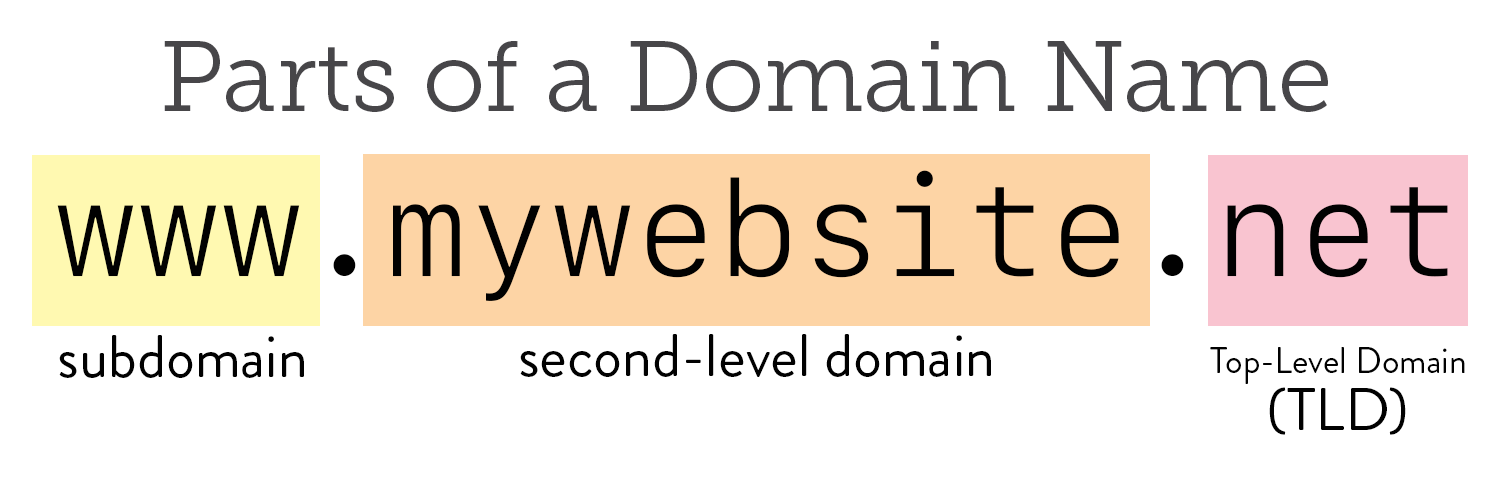I suggest getting a personal domain name if you can (I recommend porkbun.com* for domain registration). With a domain name, you don't have to change your website address if you change your hosting provider. You simply point the domain name to whichever host you want. You don't have to use your "real name". You can use a nickname, username, or "screen name". You can have a personal domain name that's not a "name" at all.
How do you get a domain name?
Domain names are managed by domain registries. You'll purchase your domain name from a domain registrar, and pay an annual fee for renewal.
- Go to a domain registrar. I recommend porkbun.com*.
- On the registrar's website, search for the domain name you want and see if it's available.
- The registration price will vary. Sometimes you'll see a "first year" sale, but be sure to check the renewal price and make sure it's something you're willing to pay.
What can you do with your domain name?
- Have a website at your domain name
- Use your domain name for custom email addresses.
- I use iCloud email with custom domain names for my whole family.
- I haven't used them, but have heard good things about Fastmail as a provider for email with custom domain support.
- Use your domain name as a handle on Bluesky
- Make subdomains like sub.mydomain.tld for other websites and self-hosted projects. Use blog.domain.tld for your blog and links.domain.tld for your link tree, for example.
- If you can't use a custom domain for something, you can set up domain name forwarders with your registrar.
More About Domain Names

When you register a domain name, it's something like mywebsite.net. In that example, mywebsite is the second-level domain or the root domain, and .net is the top-level domain. Once you have your domain name, you might put your website at a subdomain, like www.mywebsite.net. You might use other subdomains for different things, like putting your blog at blog.mywebsite.net.
What's a TLD?
The Top Level Domain is also sometimes called the "domain extension". It's the part of the domain name like .com, .net, or .edu. All two character TLDs are country codes, like .uk or .us, so use extra caution with them. Some countries allow anyone to register domain names with their TLD; others have specific rules.
TLD-List is a good resource for looking up information about different domain extensions.
Places to use your Domain Name for Free
You'll almost always need to pay an annual fee for your domain registration, but once you have it, there are some places you can use your domain name for free.
- Blogger - Blog hosting. Yes, Blogger still exists! It is easy to use and has custom domain support included for free. Blogger is owned by Google.
- Netlify - website hosting
- GitHub Pages - website hosting
- Codeberg Pages - website hosting
- Web1.0 Hosting - website hosting
- Google Sites - you can use a custom domain with Google Sites
- Bluesky - use your domain name as your username
Links
- TLD-List - Compares prices of all available Top-Level domain names, but also has good information about each TLD like who owns it and what it's for.
- Domain Name TLD Public Suffix List
- Literary Domains - Suggests great domain names from great works of literature.
Why Porkbun? Am I getting paid?
I am not getting paid to recommend Porkbun and there are no referral links or anything. I really just recommend it highly. They include whois privacy at no additional cost. That means your name and address aren't listed publicly as the owner of the domain name. They also include SSL certificates and email forwarding. They are transparent about their pricing, and will send an email if a registry that is raising the price so you can renew before it goes up.
There are other domain registrars that are pefectly fine, but Porkbun is the only one I'm comfortable personally recommending at this time. I value finding a good domain registrar. Some registrars do aggressive upselling, and charge additional fees for things like whois privacy. Some registrars will sometimes raise the price of a domain name if you search for it and come back later, or register it themselves and offer to sell it to you at a higher resale price.
In the early 2000s, I used a registrar called RegisterFly(link to Wikipedia article because it was that much of a story), which ended in a blaze of legal drama. GoDaddy bought out their portfolio and my domains were moved to them. I never liked GoDaddy, and eventually moved my domains to name.com which was pretty good for a while, and still isn't bad, but they started to have a lot of upselling and clutter on their website.
Given my experience, finding a reliable registrar that I enjoy using is important to me. I've moved to Porkbun, which doesn't have lots of upsells like name.com was beginning to, and they include whois privacy and SSL certificates.